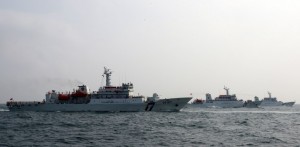Chinese patrols in Asian seas ‘legitimate’ says top general

Taiwan coast guard ships patrol duirng a demonstration in southern Kaohsiung city on March 30, 2013. Taiwan’s President Ma Ying-jeou unveiled two new ships that will join the patrol in waters off disputed islands in the East China Sea at the centre of a regional territorial row. AFP PHOTO / Sam Yeh
SINGAPORE — Chinese warships will continue to patrol waters where Beijing has territorial claims, a top general said Sunday, amid simmering rows with neighboring countries over the South China Sea and islands controlled by Japan.
Lieutenant General Qi Jianguo, deputy chief of general staff of the People’s Liberation Army, defended the patrols as legitimate and said his country’s sovereignty over the areas could not be disputed.
“Why are Chinese warships patrolling in East China Sea and South China Sea? I think we are all clear about this,” Qi told the annual Shangri-La Dialogue security conference in Singapore.
“Our attitude on East China Sea and South China Sea is that they are in our Chinese sovereignty. We are very clear about that,” he said through an interpreter.
“So the Chinese warships and the patrolling activities are totally legitimate and uncontroversial.”
Article continues after this advertisementQi was responding to a question from a delegate after he gave a speech in which he sought to assure neighbouring countries that China has no hegemonic ambitions.
Article continues after this advertisement“China has never taken foreign expansion and military conquering as a state policy,” he said in his speech.
“Although recently hot-spot issues in China’s neighbouring area keep cropping up, we have always held that conflicts and disputes should be properly solved through dialogues, consultations and peaceful negotiations.”
One delegate however said there appeared to be growing scepticism in the region over China’s peaceful intentions because it was inconsistent with moves to send naval patrols in waters where other countries have also staked claims.
China is locked in a territorial dispute with Brunei, Malaysia, the Philippines and Vietnam in the South China Sea.
The four Southeast Asian states have partial claims but China says it has sovereign rights to nearly all of the sea, including waters and territories much closer to other countries and thousands of kilometres (miles) from the Chinese coast.
China also has a dispute with Japan over the Senkaku islands, which Beijing calls the Diaoyus, in the East China Sea.
Manila last month protested at what it said was the “provocative and illegal presence” of a Chinese warship near Second Thomas Shoal, which is occupied by Philippine troops.
Among the other moves that have caused alarm were China’s occupation of a shoal close to the Philippines’ main island last year, and the deployment in March of Chinese naval ships to within 80 kilometres (50 miles) of Malaysia’s coast.
Competing claims have for decades made the area one of Asia’s potential flashpoints for military conflict. China and Vietnam fought battles in 1974 and 1988 for control of islands that left dozens of soldiers dead.